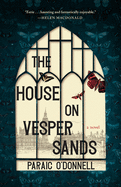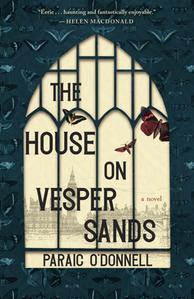
 London, 1893: There's murder with a supernatural aspect afoot. The man on the beat has a high opinion of himself, a disarming sidekick and what one citizen calls "a weakness for certain exotic cases." No, The House on Vesper Sands is not a Sherlock Holmes mystery, but Paraic O'Donnell's sophomore effort is the next best thing.
London, 1893: There's murder with a supernatural aspect afoot. The man on the beat has a high opinion of himself, a disarming sidekick and what one citizen calls "a weakness for certain exotic cases." No, The House on Vesper Sands is not a Sherlock Holmes mystery, but Paraic O'Donnell's sophomore effort is the next best thing.
The novel opens on a snowy night as a seamstress reports for duty at the home of Lord Strythe, the Earl of Maundley. Alone in the workroom, she uses a pilfered key to open a strongbox from which she removes three stoppered bottles. She throws the bottles, and then herself, out the window. The autopsy yields something remarkable: a cryptic phrase is embroidered directly on her skin.
That same night, Gideon Bliss arrives at the London boardinghouse of his uncle, Reverend Doctor Herbert Neuilly, who has written to summon his nephew from Cambridge for a reason undisclosed. Not finding his uncle at home, Bliss takes shelter at a church, where he encounters Angela Tatton, a flower maker he befriended when he was last in London. Tatton is behaving strangely, as though she has been drugged. Before Bliss can fetch a doctor, he gets knocked out. When he wakes the next morning, Tatton is gone.
Bliss returns to his uncle's boardinghouse; still the man is not at home. In an act of subterfuge wildly out of character for a mild-mannered lapsed divinity student, Bliss poses as the officer assigned to the Metropolitan Police's Inspector Henry Cutter, another lodger. Bliss intends to convince Cutter to look into the disappearances of his uncle and Tatton. That Bliss is ill-suited for fighting crime isn't lost on Cutter. "You have the constitution of a consumptive poet" is among the gentler insults he lobs at Bliss.
O'Donnell, an Irish novelist who makes his U.S. debut with The House on Vesper Sands, brings his story's humor and darker themes into richly rewarding alignment. Adding both pep and gravitas to the story is Octavia Hillingdon, who has the audacity to ride a bicycle around Victorian London and dream of writing something besides the Ladies' Page for the Mayfair Gazette. Soon she will be investigating what one lowbrow newspaper calls the "shadowy malefactors" who are targeting young women in London. " 'Shadowy malefactors,' indeed," Hillingdon scoffs. "It is like something from a bad novel." The House on Vesper Sands is a very good one. --Nell Beram, author and freelance writer
Shelf Talker: This mystery, which revolves around the victimization of young working-class women, is set in Sherlock Holmes's place and time but told on gifted novelist Paraic O'Donnell's own terms.

